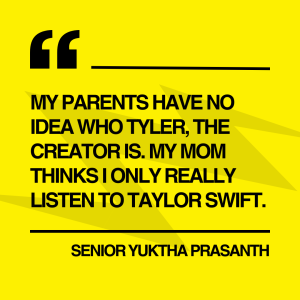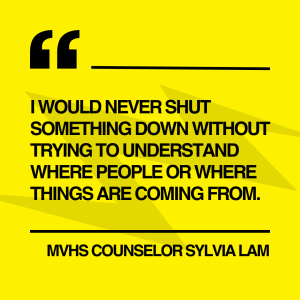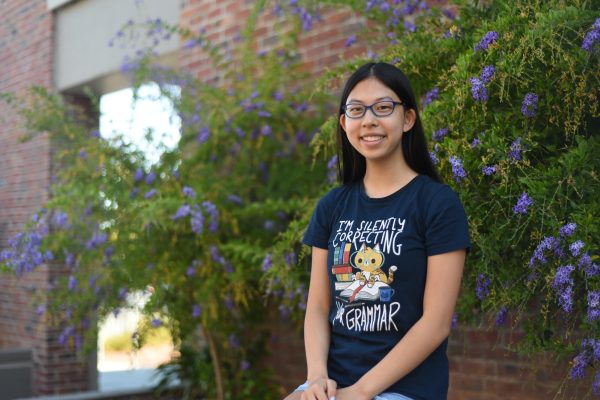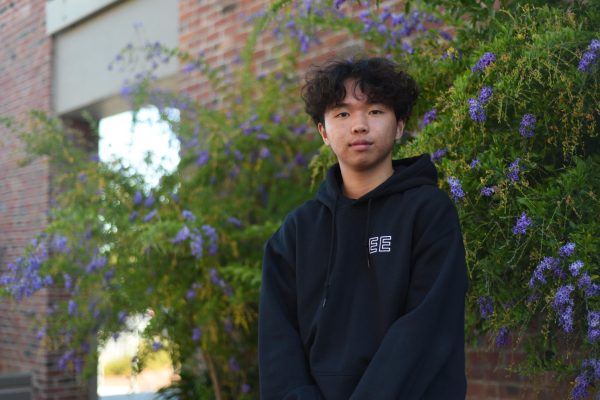The start of summer 2024 brought an influx of new music, movies and television shows. Junior Aaryan Sharma especially enjoyed listening to the new Sabrina Carpenter album “Short n’ Sweet.” To him, the songs point to a re-emergence of bubblegum pop music — pop songs with catchy choruses — and he loves the happier feeling these songs evoke. However, his parents do not share the same enthusiasm for summertime music.
Sharma says his parents don’t enjoy Hollywood movies very much and rarely listen to popular music. He feels that there is a disconnect between how his generation and his parents’ generation perceive media, especially current songs and movies which he attributes to the differences in how they grew up. While he tends towards more mainstream media, his parents enjoy watching movies from the early 2000s, movies they watched when they first came to America.
“Overall, there is a gap in what they find entertaining versus what I find entertaining,” Sharma said. “They don’t like fantasy or sci-fi because they just can’t follow the plot and they find it a bit boring and recycled. Whenever I do ask my parents if they want to go see a movie, they immediately lose interest when I tell them about the plot.”
Sharma recalls going to the theater to watch “Star Wars: The Last Jedi” with his father in 2017. Although he enjoyed it very much, his dad fell asleep within the first 10 minutes of the movie, saying it was the boring plot. Senior Yuktha Prasanth shares a similar experience. Though she enjoys listening to indie music, her family sometimes tell her the music is too slow or sad, especially in comparison to the 90s Bollywood and Indian classical music they normally listen to.
“I listen to artists like Clairo and Mitski, and my parents don’t listen to that kind of music because they think it’s very low energy,” Prasanth said. “A lot of the music that they listened to when they were younger plays a much bigger role in their life now than American pop culture. My parents have no idea who Tyler, the Creator is. My mom thinks I only really listen to Taylor Swift.”

Nonetheless, Sharma says that everybody inherently has different tastes, which may contribute to the difference between what he and his parents enjoy. Prasanth also acknowledges this but says the clear difference between the way they were raised is the biggest factor in the way they perceive current media. Both Sharma and Prasanth refer to the immigrant experience of their parents, noting how the transition from one country to another is one of the biggest factors for the disconnect.
“There’s definitely some sort of culture shock, with me growing up here in America and my parents growing up in India at a completely different time,” Prasanth said. “One of my dreams since I was in middle school is to go to see a concert live in person, and I feel like going to a concert and experiencing it with them would also help me share my love for artists or their music, but my parents aren’t really open to that kind of idea.”
Prasanth and Sharma both agree the way different generations view the explicit and more mature themes covered in recent movies and albums also contributes to the gap. Prasanth recalls her dad questioning her music taste when she played a song by rapper Megan Thee Stallion — an artist known for her fairly vulgar lyrics — out loud, and Sharma notes a similar distaste his parents show for the more crude aspects of American music embraced by many artists.
“My parents find a lot of American music provocative, specifically with female artists,” Sharma said. “The provocative language in rap music is one thing. Also, if an artist wants to show a lot of skin in a music video or in an album cover, they don’t find it appropriate. Overall, cuss words are also a big thing. They don’t really understand what the purpose is for many of the things artists do.”
However, MVHS counselor Sylvia Lam says her family’s interests align more closely. Being a mother of two daughters, she spends a lot of time watching TV series that are made for teenagers such as “Abbott Elementary” or based off of book series made for children like “Percy Jackson and the Olympians,” both of which she enjoyed. Rather than an inherent gap between generations, Lam believes there isn’t enough understanding facilitated between parents and children, especially when it comes to more explicit themes.
“I don’t think it’s necessarily parents not being happy, but I think it really has to go back to how we educate our own children and how we ground them because they’re always going to hear things and see things that we may or may not agree with,” Lam said. “There’s music that probably my older one listens to that I may be like, ‘Hmm, that’s not in my music forte.’ But OK, like, ‘Where’s that coming from? Where’s their interests there?’ I would never shut something down without trying to understand where people or where things are coming from unless it’s harmful to oneself or to another.”

Though Lam says some of her success at connecting with her daughters comes from working at a high school and being more in touch with teenager’s interests, she comments that communication is the most important thing, not just to establish common interests within current media, but to establish connections between parents and their children in general.
“Growing up, it wasn’t like now, where I think a lot of movies or shows portray a lot of topics that probably weren’t discussed before,” Lam said. “That’s important because that also brings education and again, always going back to being able to have those discussions with your children openly at home and really have an understanding is the most important thing.”
Prasanth has been slowly attempting to bridge the gap between her and her parents by watching things they both can enjoy. Prasanth has since developed a deeper appreciation for Bollywood movies, and her parents have finally been able to watch some shows with her.
“Sometimes we watch ‘Young Sheldon,’” Prasanth said. “My parents can understand most of what was going on, and I feel like it also has this vintage feel. It’s set somewhere in the 20th century, so there’s a lot that can resonate with them because there are a lot of commonalities with their childhood. I also think it’s a funny and entertaining show, so we can bond over that.”
Similarly, Sharma has been purposely picking more family-friendly American media to enjoy with his parents. He embraces the idea of watching things with them to foster a deeper connection, and he hopes that they might be able to branch out and watch other current media as he grows older. To him, the key is striking a balance between what he likes and what he can share with his family.
“I do want to bridge that gap,” Sharma said. “I think it is important to make sure that I develop a connection with them, and media is a big part of that. But I also want to make sure that I’m not losing sight of my interests and what I find entertaining just to create that relationship because there’s a way to make sure that you can meet everyone’s needs and find something entertaining for everybody.”













